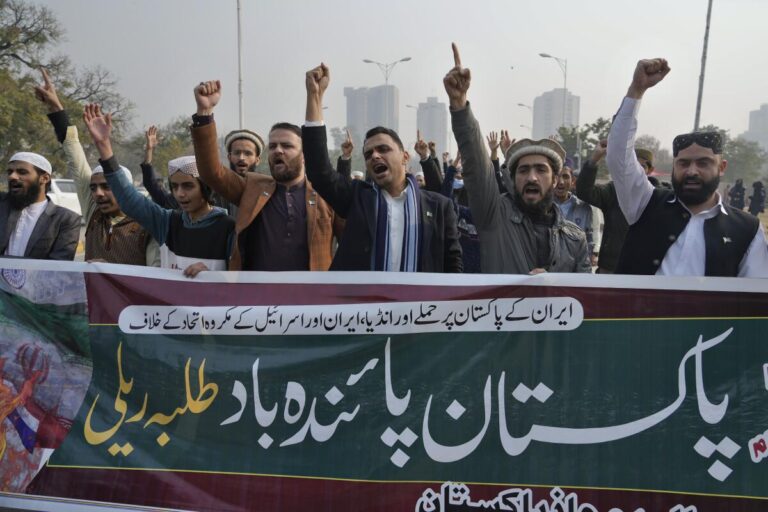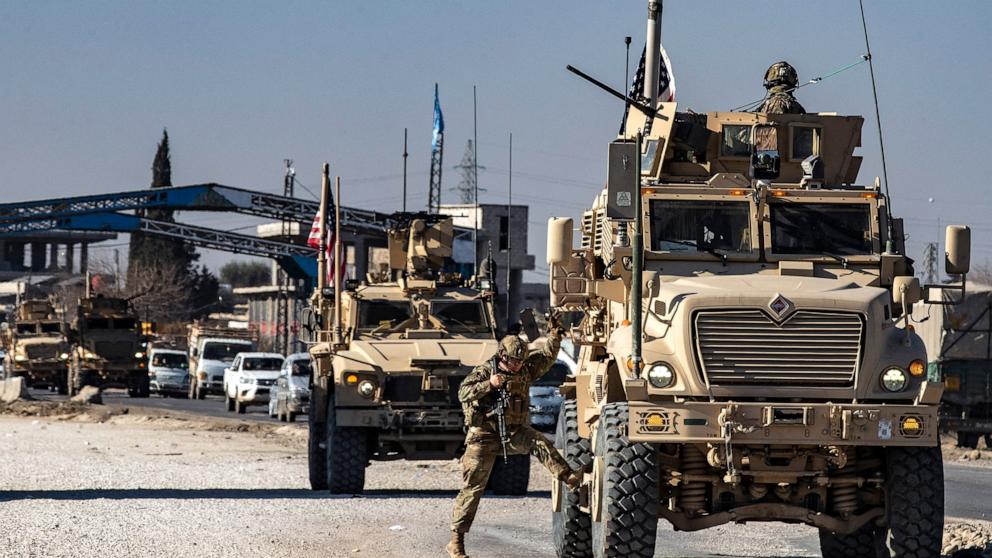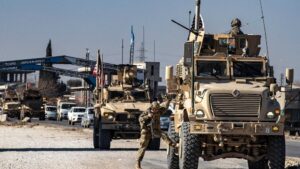Pakistan’s air force launched retaliatory airstrikes early Thursday in Iran allegedly targeting militant hideouts, an attack that killed at least nine people and further raised tensions between the neighboring nations.
The tit-for-tat attacks Tuesday and Thursday appeared to target two Baluch militant groups with similar separatist goals on both sides of the Iran-Pakistan border. However, the two countries have accused each other of providing safe haven to the groups in their respective territories.
The strikes imperil diplomatic relations between the two neighbors, as Iran and nuclear-armed Pakistan have long regarded each other with suspicion over militant attacks. Each nation also faces its own internal political pressures — and the strikes may in part be in response to that.
The attacks also come as the Middle East remains unsettled by Israel’s war with Hamas in the Gaza Strip. Iran also staged airstrikes late Monday in Iraq and Syria over an Islamic State-claimed suicide bombing that killed over 90 people in early January.
Pakistan’s Foreign Ministry described their attack Thursday as “a series of highly coordinated and specifically targeted precision military strikes.”
“This morning’s action was taken in light of credible intelligence of impending large scale terrorist activities,” the Foreign Ministry said in a statement. “This action is a manifestation of Pakistan’s unflinching resolve to protect and defend its national security against all threats.”
Pakistan’s military described using “killer drones, rockets, loitering munitions and standoff weapons” in the attack. Stand-off weapons are missiles fired from aircraft at a distance — likely meaning Pakistan’s fighter jets didn’t enter Iranian airspace.
Pakistan’s caretaker Prime Minister Anwaarul-Haq-Kakar, who is in Switzerland to attend the World Economic Forum in Davos, cut his trip short to return home.
A deputy governor of Iran’s Sistan and Baluchestan province, Ali Reza Marhamati, gave the casualty figures from Thursday’s strike, saying the dead included three women, four children and two men near the town of Saravan along the border in Iran’s Sistan and Baluchestan province. He added that the dead were not Iranian citizens.
The Baluch Liberation Army, an ethnic separatist group that’s operated in the region since 2000, said in a statement the strikes targeted and killed its people.
“Pakistan has martyred innocent Baluch people,” it said.
Pakistan’s military also said the strikes hit targets associated with the Baluchistan Liberation Front, though that group did not acknowledge the claim.
HalVash, an advocacy group for the Baluch people, shared images online that appeared to show the remains of the munitions used in the attack. It said a number of homes had been struck in Saravan. It shared videos showing a mud-walled building destroyed and smoke rising over the strike immediately after.
Iran later summoned Pakistan’s charge d’affaires in the country. Pakistan already had withdrawn its ambassador over Tuesday’s attack.
Pakistan named its operation “Marg Bar Sarmachar.” In Iranian Farsi, “marg bar” means “death to” — and is a famous saying in Iran since its 1979 Islamic Revolution used to refer to both the United States and Israel. In the local Baluch language, “sarmachar” means guerrilla and is used by the militants operating in the cross-border region.
Pakistan’s Baluchistan province, as well as Iran’s neighboring Sistan and Baluchestan province, already have faced a low-level insurgency by Baluch nationalists for more than two decades.
However, the groups targeted in the days of strikes are different. Jaish al-Adl, the Sunni separatist group that Iran targeted Tuesday, grew out of another Islamic extremist group known as Jundallah once alleged to have ties to al-Qaida. Jaish al-Adl has long been suspected of operating out of Pakistan and launching attacks on Iranian security forces.
The Baluch Liberation Army, which has no religious component and has launched attacks against Pakistani security forces and Chinese interests, is suspected of hiding out in Iran. The Baluchistan Liberation Front is similarly nationalistic.
Both Iran and Pakistan face internal political pressures. For Iran, there’s been growing pressure for action after the Islamic State group attack, Israel’s war on Hamas and wider unrest against its theocracy. Meanwhile, Pakistan faces a crucial February general election as its military remains a powerful force in its politics.
The risk of escalation remained Thursday as Iran’s military will begin a planned annual air defense drill from its port of Chabahar near Pakistan all across the south of the country to Iraq. The drill, Velayat 1402, will include live fire from aircraft, drones and air defense systems.
Iran and Pakistan share a 900-kilometer (560-mile), largely lawless border in which smugglers and militants freely pass between the two nations. The route is also key to global opium shipments coming out of Afghanistan. The Taliban separately urged restraint amid the tensions.
For both Iran and Pakistan, the cross-border attacks renew questions about the preparedness of their own militaries, particularly their radar and air defense systems.
For Pakistan, such systems are crucial as tensions always remain at a low boil with India, their nuclear-armed rival. Their equipment has long been deployed along the frontier, rather than its border with Iran. For Iran, it relies on those systems against potential strikes by its main enemy, the U.S.
“The government and military have been under immense pressure,” said Abdullah Khan, an analyst at the Pakistan Institute for Conflict and Security Studies. “Iran celebrated (Tuesday’s) attack in its media and the Pakistani public perception of a strong army is not as it used to be, so it had to respond.”
There’s also complex geopolitical considerations in the tensions. Pakistan’s military relies on American, Chinese and French fighter jets for its air force — meaning some of those foreign weapons were used in Thursday’s attack.
China, a crucial partner in both countries, has urged restraint. Beijing is a key regional player and has a major Belt and Road development in Gwadar port in Pakistan’s Baluchistan province. Baloch, the Foreign Ministry spokesperson, said she was not aware of any direct Chinese mediation in the conflict so far, though Beijing has offered it.
“China sincerely hopes that both sides can exercise calm and restraint and avoid escalation of tension,” Chinese Foreign Ministry spokesperson Mao Ning said Thursday.
AP



























